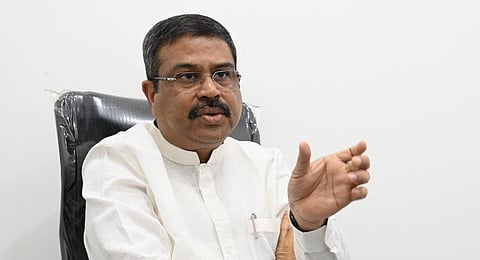

NEW DELHI: Union Education Minister Dharmendra Pradhan on Thursday said that there is no difference between ‘Bharat’ and ‘India’ but in the minds of a few “frustrated people”, there is a “competition to dispute the concept of Bharat.”
He said that both the names have been incorporated in the Indian Constitution. “There has been an ongoing controversy in the past few days over the name Bharat and India. There is no difference between India and Bharat. Bharat is the name of India,” he said, inaugurating the western zone vice chancellors’ conference on the implementation of NEP 2020 in Gujarat’s Kevadiya in the Narmada district.
“Both these names have been mentioned in our Constitution. There has been mindless controversy by people who wish to create a ruckus,” he said. Pradhan’s remarks came after a panel set up for revising the NCERT social science textbooks recommended that ‘India’ should be replaced with ‘Bharat’ in all social science textbooks up to Class 12. The recommendation to change the name invited sharp criticism from the opposition.
Pradhan elaborated that “during the colonial period, people who read English literature gave the country the name India and we in our Constitution have given significance to both Bharat and India.” “Bharat is an Indian name; the original name. It has been so since the introduction of civilisation, but today, in the minds of a few frustrated small-minded people, there is a competition to dispute the concept and it is a small section of people,” he added.
He further said, “Some Western experts who have mentioned science and technology have mentioned India’s thinking. Centuries ago, why did Hiuen Tsang come here? To understand what? This is the tradition of India.” Highlighting the importance of local languages, Pradhan said, “Our languages have never been a hindrance in the development of civilisation.
All languages in India are national languages. Because of technology, there are no challenges. Skilling is another priority area. If we convert the samajik parampara (social traditions) of the Gujarat and Maharashtra models of job creation into academics, it will be one of the best practices,” he said. The seven-member panel had also suggested introducing ‘classical history,’ instead of ‘ancient history,’ in the curriculum and including the Indian Knowledge System in the syllabus for all subjects. The committee has also suggested highlighting ‘Hindu victories’ in textbooks.